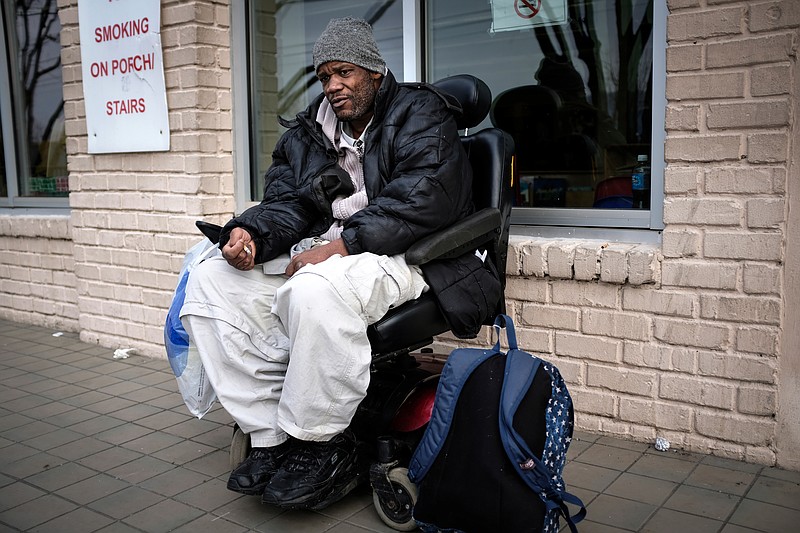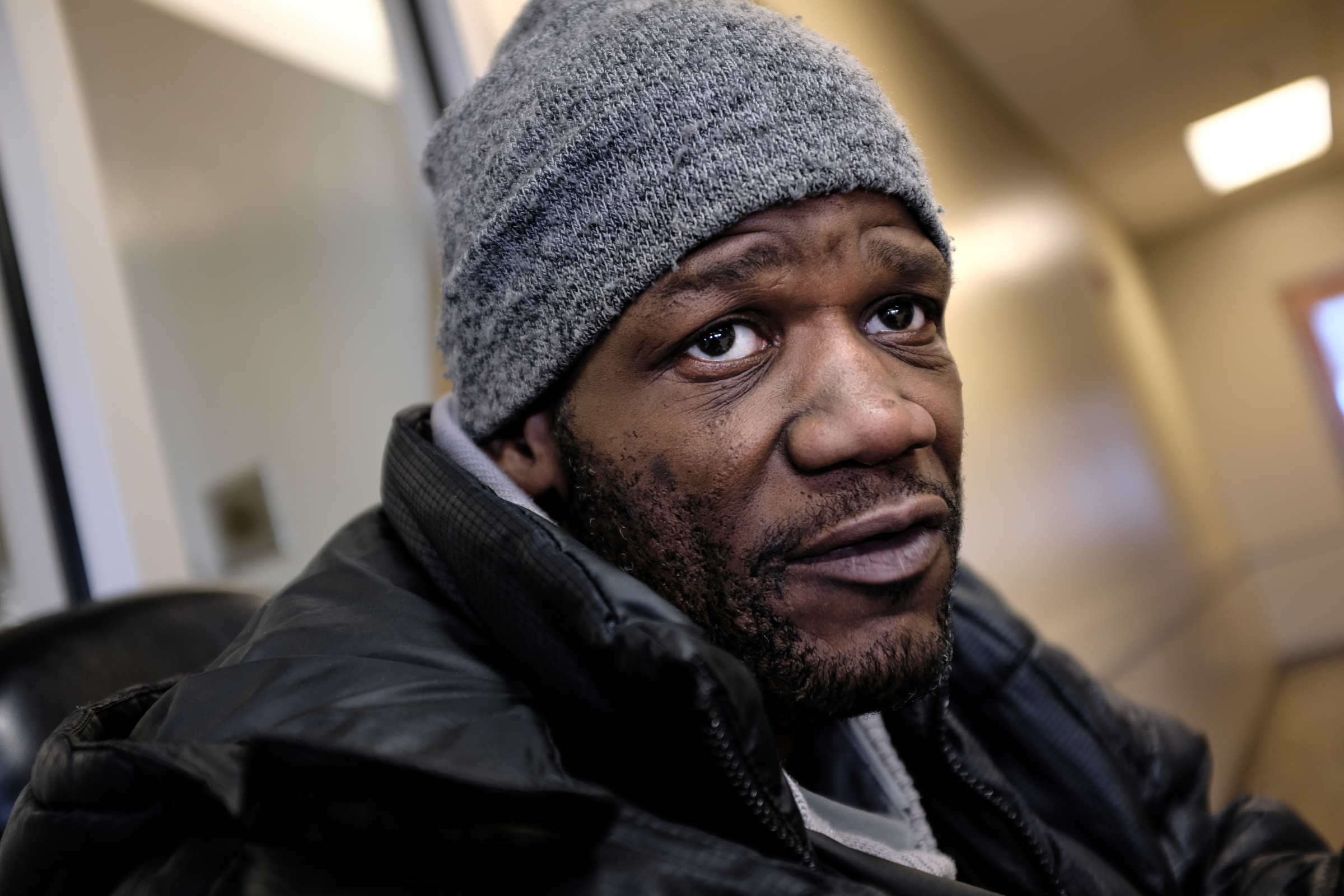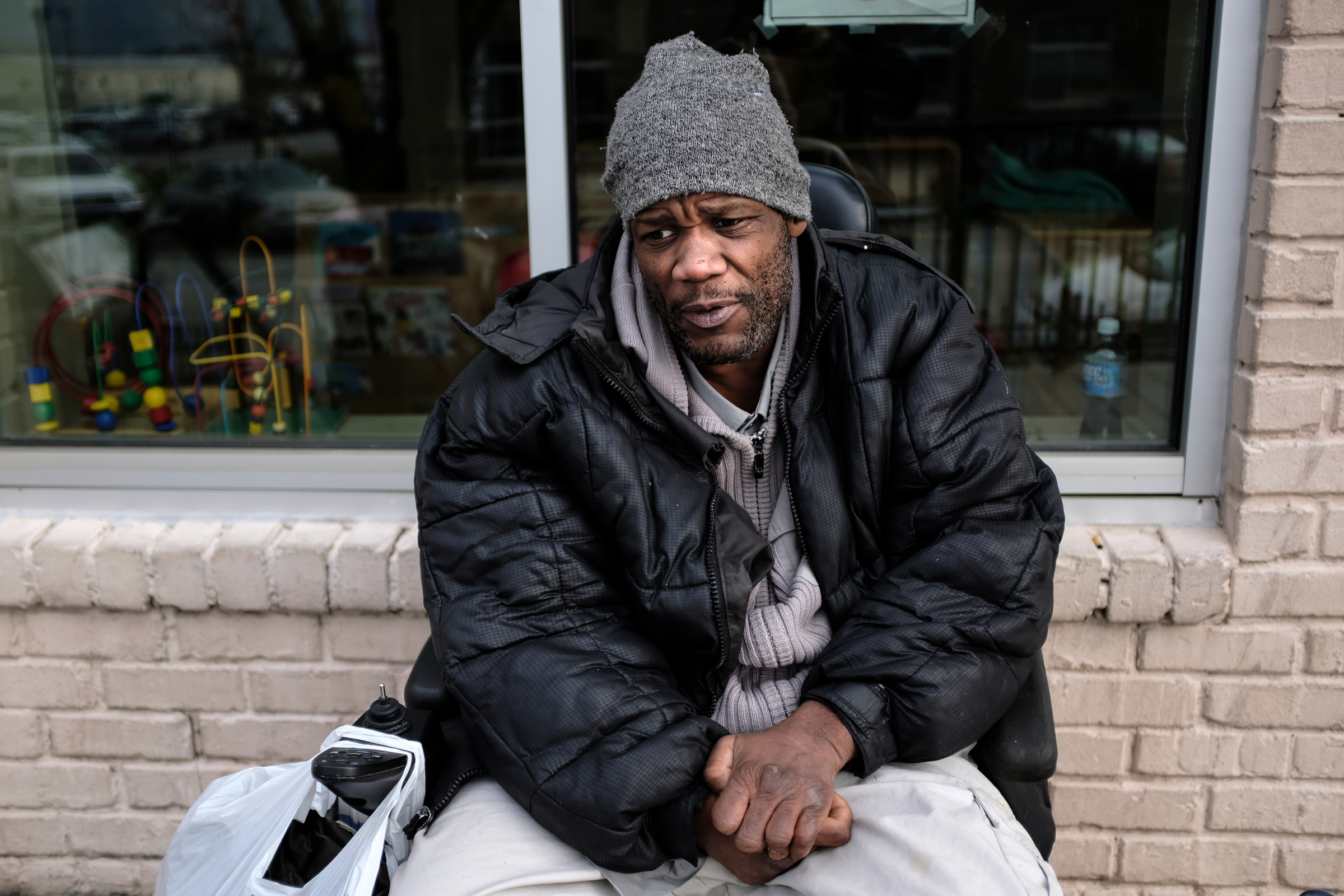A paraplegic man who was charging his wheelchair outside a grocery store will be tried later this month in Hamilton County Criminal Court on charges he assaulted a police officer.
Christopher Leo Hardaway, 45, who had been banned from the Food City on 23rd Street last year, pulled a knife on Officer Timothy McFarland during an argument with him, instead of leaving the property as he was ordered to do, according to police.
But Hardaway, who plans to represent himself in court, says he tried to disclose the knife to the officer, not attack him. The officer's body camera footage shows that, he argues.
Hardaway believes his case underscores a major issue: the harassment experienced by disabled and homeless people who are mostly non-violent, have no jobs or other prospects and often just need help.
Advocates say officers often demand compliance instead of trying to understand a person's disabilities. Chattanooga Police Department officials said they could not comment on the case. But, they said, they are listening. The Hamilton County Sheriff's Office says about 380 officers have received de-escalation training since 2009 to increase safety for cops and citizens.
"When we asked a person to do something, it was to be done," said Charles Lowery Jr., deputy chief of law enforcement at the Hamilton County Sheriff's Office. "That was the mindset back then. Well, that mentality has changed over the years, because we needed to learn how to address individuals, since we could have been the catalyst that raised the level or caused the problem."
Hardaway doesn't believe he should have been viewed as a problem for law enforcement on Sept. 3.
He was charging his wheelchair outside the Food City when McFarland approached. A Food City representative could not be reached for comment, but McFarland said he patrols the area and knows Hardaway. McFarland said he'd banned Hardaway from the property months before for charging his wheelchair and told him to leave again.
Hardaway said he wouldn't get very far on a low battery. There aren't many other charging spots between the store and his sister's apartment on Germantown Road.
Weeks before, Hardaway said his wheelchair had died nearby, leaving him stranded on the sidewalk for eight hours, with no one offering help. He eventually fell asleep and was awakened when an officer shined a light on him, asking why he was sitting in the cold, blocking the sidewalk with urine soaking his lap.
Frustrated no passing police cruisers had stopped to help during his ordeal, Hardaway refused to move. He was charged with disorderly conduct, public intoxication and obstruction of the roadway. Hardaway is seen insisting he hadn't been drinking on the footage from the officer's body camera.
Because of that encounter, Hardaway was wary on Sept. 3.
Hardaway admits he has a poor reputation among police for past burglary and assault convictions. But they were before a 2004 car wreck paralyzed him from the neck down. Now a paraplegic, Hardaway says he's no threat. He can't move his fingers well enough to shake hands. He can't move his legs without help. He can't control his bladder, so he often urinates on himself. He says he struggles with paranoid schizophrenia and anger management.
"This is the second time I've been harassed by y'all for nothing," Hardaway said to McFarland. "The last time, my chair wouldn't get off that curb and y'all locked me up instead of helping me get to a charger."
Hardaway is charged with aggravated assault - a Class C felony that carries three to 15 years in prison - because of what happened next.
"All I'm asking is, are you going to take me to jail? That's all I really want to know," Hardaway said, "because I'm not getting harassed or put out [when] I need to charge my chair."
"Not from this [property]," McFarland said.
Hardaway said he was ready to go to jail.
"Would you like another charge?" Hardaway then asked, reaching into his waistband, "because I'm disclosing this knife."
Hardaway pulled out a 4-inch blade. McFarland stepped back and pulled out a gun.
"Drop it!" McFarland screamed.
"I'm not even doing anything," Hardaway said, dropping the knife. "I'm disclosing this to you!"
McFarland saw it differently: "I gave you every chance to leave," he said, "and you want to pull a knife on me!"
The officer called into his mic for backup then told Hardaway, "You're welcome for saving your life, because I didn't shoot your -- right here."
"Shut up," Hardaway said. "You know I wasn't going to hurt you."
___
David Perry, a former professor and journalist in Minnesota who chronicles interactions between law enforcement and people with disabilities, says Hardaway's experience isn't an anomaly.
"Someone is put in a position where they have to comply, and if they can't, they're treated as dangerous or criminal," Perry said. "The No. 1 thing I say is officers need to stop treating noncompliance on its own as a reason to escalate" and assume that a disability or similar factor is at play.
Similar interactions happen every day in America, Perry said. A sheriff's deputy in Tampa, Fla., threw Brian Sterner from his wheelchair in 2008 because he thought Sterner was faking a disability. Two officers in Washington, D.C., tossed Dwight Harris from his chair in May 2011 for alleged intoxication and non-compliance.
An estimated one-third to one-half of all people killed by police in the U.S. have a disability, according to a 2016 report from the private, Boston-based Ruderman Family Foundation.
Officers also face danger and uncertainty in these situations. In many cases, they encounter people they've never met before and caution is warranted.
After Memphis police shot and killed a man in 1987 who was cutting and stabbing himself with a butcher knife, the department created the Crisis Intervention Team (CIT), which focuses on teaching officers to use empathy, listening skills and other nonviolent techniques to calm people.
The Chattanooga, Soddy-Daisy, Red Bank, East Ridge and Collegedale police departments, as well as sheriff's offices in Hamilton, Catoosa and Grundy counties, train their officers through a voluntary 40-hour CIT program.
Chattanooga Assistant Police Chief Danna Vaughn said the department records incidents with people who have disabilities so CIT-trained field officers know whom they're approaching.
"Typically, the dispatchers will let the officer know if they think they're dealing with a mental health consumer," Vaughn said.
___
Prosecutors declined to comment for this story, but they secured indictments against Hardaway, a career criminal who could be sentenced at the highest range of punishment.
Hardaway has already had some success representing himself. Squaring off against a prosecutor at a recent bond hearing, Hardaway cross-examined a witness and convinced Judge Tom Greenholtz to reduce his $17,000 bond to $1,000.
But he missed a court date last week, and Greenholtz issued a warrant for his arrest. Hardaway is now being held in county jail on a $500 bond and will appear Friday in Criminal Court in advance of his Feb. 27 trial.
Hardaway said he wants to prove his innocence as soon as possible. So Attorney Zak Newman, who will assist Hardaway, has filed two motions on his behalf. One asks for a quick and speedy trial. The other asks for permission to write motions for Hardaway "due to his extremely limited dexterity."
Contact staff writer Zack Peterson at zpeterson@timesfreepress.com or 423-757-6347. Follow him on Twitter @zackpeterson918.


